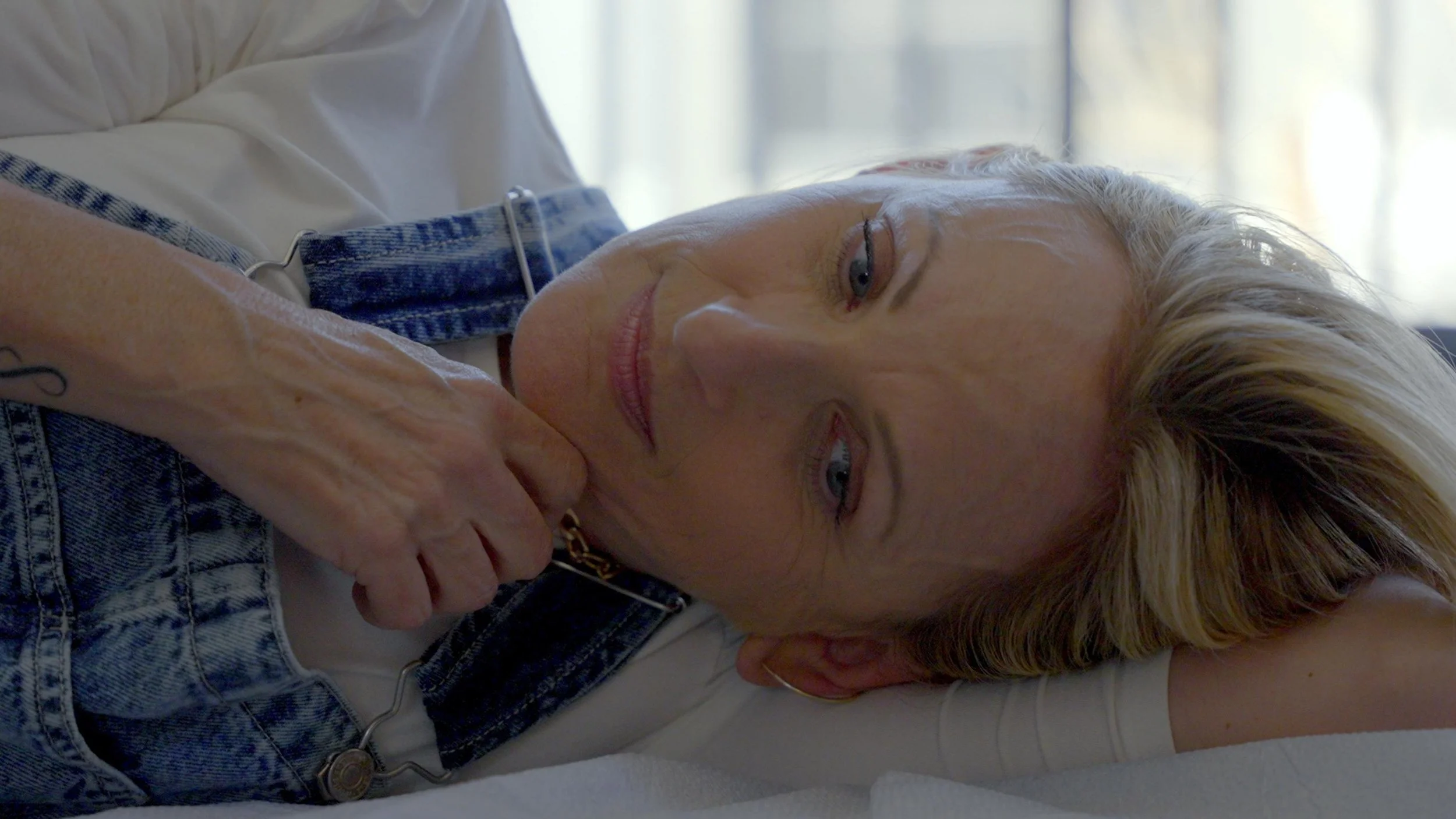
Best of SXSW: Documentaries
March 28th, 2025 / Kevin Ward
From intimate character portraits to bold investigations, these are the standout non-fiction films that made a lasting impression in Austin this year.
The Perfect Neighbor
Comprised entirely of real police bodycam footage, this documentary-cum-horror-show charts the banal-to-lethal trajectory of a Florida woman's repeated 911 calls about children playing near her rented home. What begins as a nuisance complaint curdles into something far more malignant: a testament to how the slow drip of performative grievance, legitimized by systems ill-equipped to question motive, can calcify into tragedy.
The film's aesthetic restraint is radical in its own right. No talking heads. No omniscient voiceover. No editorializing music cues. Just unvarnished digital testimony from the increasingly exasperated officers dispatched again and again to a suburban neighborhood where childhood joy is treated as a threat. The woman at the center, glimpsed only in fragments, becomes a kind of negative space—the anti-neighbor—whose weaponization of law enforcement echoes the archetype of the "Karen," but devoid of the meme-ified levity. Here, her calls don't merely inconvenience; they carry the potential for irreversible harm.
That harm arrives, eventually and predictably. The film's genius is not in foreshadowing the fatal incident—which savvy viewers will anticipate with a sinking feeling—but in the way it constructs an ecosystem of complicity. The officers, some of whom push back, others who clearly sense the absurdity, are shown juggling procedural decorum with personal discomfort. They become unwitting players in a theater of escalation, bound by the call log and the obligations of their uniforms. The horror isn't just what happens—it's how long it takes to get there, and how little has to be done to make it happen.
What separates The Perfect Neighbor from the parade of similar real-life stories is that, this time, the postscript does not read as complete institutional failure. The officers' accumulated bodycam footage ultimately helps discredit the stand-your-ground claim, revealing not only the unreliability of the woman's narrative but the pattern of behavior that preceded the shooting. It registers, in a grim twist, as something resembling justice—though stripped of any catharsis. A child is gone, not because of a singular act of violence, but because a bureaucratic apparatus allowed itself to be wielded as a bludgeon by someone cloaking their animus in legal language. The weapon wasn’t a gun; it was the system itself, complicit and obliging, in the hands of a self-anointed sentinel.
And yet, The Perfect Neighbor compels in its quiet outrage. It stares unflinchingly at the loopholes of power—who invokes it, who enforces it, and who suffers from its abuse. It’s a procedural in the most literal and chilling sense, less about crime than about how crime is framed, anticipated, and in some cases, made inevitable. A difficult film, yes. But also one that demands to be watched, not despite the discomfort, but because of it.
Credits: Directed by Geeta Gandbhir Produced by Message Pictures. US Release Date: Awaiting Distribution
Credit: Star Thrower Entertainment
Deaf President Now!
The paradox of power is that those who hold it are often least equipped to understand the needs of the people they're meant to serve. Deaf President Now!, a lucid and long-overdue chronicle of the 1988 uprising at Gallaudet University, confronts this disconnect with startling clarity. The film reanimates a pivotal moment referenced in The Marlee Matlin Story, which sparked my curiosity. I was too young to register the movement as it happened, but the resonance is immediate and undiminished.
The film proceeds with the methodical pacing of a procedural, assembling the facts of the case like pieces on a chessboard: a Deaf university, two qualified Deaf presidential candidates, and a board of directors that instead anoints a hearing woman with no knowledge of sign language. The logic is paternalistic at best, colonial at worst. At the center of this misstep is board chair Jane Bassett Spilman, whose assertion that “Deaf people are not ready to function in a hearing world” is as tone-deaf as it is historically revealing—a flashpoint of ableist thinking dressed in the soft rhetoric of readiness.
But this is not merely a story of bureaucratic blundering. What gives Deaf President Now! its charge is its attention to voices—specifically, those of the students and faculty who turned protest into precedent. The talking-head interviews, restrained in number but rich in insight, frame a communal act of resistance not as spontaneous combustion but as a slow boil of institutional neglect finally reaching its inevitable spillover. The personal recollections offer clarity, nuance, and above all, conviction.
If the film occasionally flirts with conventional uplift, its grounding in systemic critique keeps it honest. These students were not asking for a revolution; they were asking for a leader who could speak their language—literally and symbolically. The fact that this request was considered radical says more about the society around them than about the students themselves.
Deaf President Now! is not just an archival document but an ideological touchstone. It reminds us how fragile representation is, and how hard-won it becomes when filtered through the condescension of those who presume to know better. That the students of Gallaudet won is a triumph. That they had to fight this hard is the tragedy. A vital work of reclamation.
Credits: Directed by Nyle DiMarco, Davis Guggenheim Produced by Concordia Studios. US Release Date: TBD (Apple TV+)
Credit: Courtesy of Apple TV+
We Are Storror
We already included Michael Bay’s first documentary feature in our Surprises of SXSW coverage, but it bears repeating: We Are STORROR is an exhilarating dive into the world of parkour, told through the lens of its most daring and tight-knit crew. With gravity-defying stunts and unexpected introspection, it more than earns a spot here as one of the best docs of the festival. Revisit why it surprised us here.
Credits: Directed by Michael Bay. Starring Josh Burnett-Blake, Benj Cave, Max Cave, Callum Powell, Sacha Powell, Toby Segar, Drew Taylor. Produced by Make Make. Release date: Awaiting distribution
Sally
“What will you do if something goes wrong while you’re up there? Will you start weeping?” The question—posed on national television, no less—lands like an unintentional punchline in Sally, a documentary that expertly toggles between reverence and quiet indignation. The answer, of course, is that she didn’t. Not when she was the first American woman in space. Not when NASA, an institution that could calculate lunar trajectories to the millimeter, packed her hundreds of tampons for a weeklong mission. And not when she decided that a life lived partially in secret was the only safe route through a culture still recovering from the spectacle of Billie Jean King’s forced outing.
What Sally grasps, and what makes it linger, is the way Ride’s story has always been curated—by her, for her, and eventually, about her. The film doesn’t so much correct the record as it excavates it, revealing the sediment of institutional sexism and the silences demanded by heteronormativity in equal measure. Ride’s partnership with Tam O’Shaughnessy, long hidden from public view, becomes less a scandalous reveal than a statement about the impossibility of full personhood when history demands only heroism.
Director Christina Constantini avoids hagiography not by puncturing Ride’s mystique, but by contextualizing it—framing her famous composure as both a necessity and a cost. The archival footage is at times surreal, a carousel of 20th-century microaggressions masquerading as morning show banter. But Sally doesn’t gawk; it observes, then reflects. Ride’s legacy emerges not just in what she achieved, but in what she chose to shield—and the film treats that choice not as a failing, but as a strategy for survival.
There’s a version of this film that might have ended with Ride ascending into the stars. This one keeps looking back down, at the atmosphere she had to break through just to get there.
Credits: Directed by Christina Constantini. Starring Billie Jean King, Tam O’ Shaughnessy, Kathy Sullivan, Anna Fisher, John Fabian, Steve Hawley, Bear Ride, Joyce Ride, Lynn Sherr Produced by NatGeo. Release date: TBD
Credit: NASA
Marlee Matlin: Not Alone Anymore
There's an inherent paradox in being the first: you're singular, yet expected to stand in for many. Marlee Matlin: Not Alone Anymore understands this tension and probes it with nuance, revisiting Marlee Matlin's historic Best Actress win at the 1987 Oscars—a win that crowned her both the youngest actress and the first deaf performer to receive the honor, and just as swiftly burdened her with the mantle of representation she never consciously sought.
Rather than offering a glossy or overly reverent portrayal, the film wrestles with the complex image of Matlin as not only a symbol but also a person—a young woman in her early twenties abruptly yoked to the role of cultural ambassador for an entire community. Her recollections are pointed, but rarely self-pitying, striking a balance between retrospection and resilience. We see not just the glory of her moment, but the slow erosion that follows when systemic change doesn't rush in behind the first crack in the dam.
One of the documentary's most poignant throughlines is the generational baton pass that occurs more than three decades later, when Matlin plays a key role in shepherding CODA to the screen. That film’s Best Picture win—and Troy Kotsur's own Oscar, making him only the second deaf performer to be recognized by the Academy—represents not just vindication, but culmination. If Matlin’s Oscar was an exclamation point, CODA is the long-overdue follow-up sentence. Fittingly, the documentary draws subtle resonance from CODA itself—not only as an acronym, but as a musical term signifying the end of a composition. And while a coda traditionally signals closure, the hope is that this one acts as a bridge—not to silence, but to a more expansive, inclusive composition. A transition into verses still unwritten, sung by voices that have too long gone unheard.
Credits: Directed by Shoshannah Stern. Starring Marlee Matlin, Troy Kotsur, Henry Winkler, Aaron Sorkin, Lauren Ridloff, John Maucere, Randa Haines, Sian Heder, Shoshannah Stern, Jack Jason Produced by Actual Films. Release date: TBD
Credit: Aurora Brachman
Spreadsheet Champions
Spreadsheet Champions is a low-key but engaging documentary that follows six students competing in the Microsoft Excel World Championship. The direction is observational and restrained, allowing the personalities of the participants to come through naturally. The result is an international portrait of teenagers and young adults who take this competition seriously and approach it with impressive intensity.
Among the standouts is Carmina, a 16-year-old from Guatemala whose aesthetic and affect run almost comically counter to the steely associations of data manipulation. She adores One Direction, dreams of YouTube stardom, and lives in a pink-splashed world that would feel more at home in a tween rom-com than a tech-based competition. But it would be a mistake to dismiss her as an outlier or comic relief—her mastery of Excel is formidable, her charisma undeniable. Her presence complicates any assumptions about what it means to be a "numbers person" in the digital age.
The other competitors—De la Paix from Cameroon, Alkmini from Greece, Braydon from Australia, Nam from Vietnam, and Mason, the youngest at 15, from the United States—are sketched with similar care. The film resists turning them into archetypes or reductive avatars for national pride. Instead, it lingers on their particularities: the rhythms of their speech, their pre-competition rituals, their quiet anxieties. The competitive sequences themselves, however, remain somewhat shrouded in abstraction. Due to the secretive nature of the exam content, viewers are left largely outside the mechanics of the actual problems being solved. This veil of opacity is understandable—perhaps even legally necessary—but frustrating nonetheless.
As someone who once spent far too much time navigating the eccentricities of Excel for professional reasons, I longed for a more granular breakdown of what distinguishes a good solution from a great one. How did each contestant approach the challenge? Were there moments of risk, of intuition, of elegant simplicity? The absence of these details leaves a thematic gap at the film’s core—a reluctance to fully engage with the intricacies of its chosen world.
Still, Spreadsheet Champions is a blast. It captures the stakes, the tension, and the sheer joy of mastery in an unexpected field. While we don't get to see every formula or function in action, the film's charm lies in how seriously its subjects take their craft—and how easy it becomes to root for them because of it. Proof that even something as seemingly dry as Excel can be transformed into high-stakes drama when the right people are behind the keyboard.
Credits: Directed by Kristina Kraskov. Produced by Good Thing Productions. Release date: Awaiting Distribution
Credit: GoodThing Productions & Peculiar Pictures
Shuffle
I thought I hated the American healthcare system before, but Shuffle poured gasoline on that fire. A film as incendiary as it is indispensable, it reveals not just a broken system, but one functioning precisely as designed—for profit, not for care. Winner of the Jury Award for Documentary Feature at SXSW, this searing, structurally elegant exposé turns the rot of insurance-funded addiction treatment into a kind of waking nightmare, where the bureaucratic becomes baroque and suffering is just another line item.
Inspired by director Benjamin Flaherty's own successful recovery, the film was born from his growing horror at the stories shared by friends—rehab experiences not defined by healing but by billing. Filmed over three years, the documentary follows three individuals caught in this death cycle with no clear path for actual recovery. Their stories form the film’s emotional bedrock, but the true subject is the perverse logic of a system where people aren't treated as patients, but instead commodified into insurance policy holders—their value stripped down to the information on the front and back of their insurance cards. Through the lens of the filmmaker’s own history—he narrates with a pointed weariness that resists melodrama—the film maps out a web of policy loopholes and opportunistic grift.
What’s uncovered is nothing short of Kafkaesque: addicts recruited by middlemen and offered small cash incentives to “move” (on paper) to states like Ohio or Wisconsin with public health options with the most expansive out-of-network coverage; flown out, checked into rehab clinics whose business model hinges not on healing but on exploiting billing codes—daily urine tests, inflated lab work, shipping fees, and outpatient group therapy sessions designed less for therapeutic gain than insurance fraud. The cruelty doesn’t end there. In the film’s most harrowing revelation, some recruiters incentivize relapse itself, paying clients to fall off the wagon so the cycle—and the revenue stream—can begin anew.
It’s easy to imagine a more histrionic version of this film, but Shuffle is admirably controlled in its outrage, allowing the horror to accumulate naturally through anecdote and analysis. The editing is crisp, the tone precise, the stakes devastating. Not everyone survives to end of the film. That anyone makes it out of this system alive is both a miracle and a fluke. While the film resists clear-cut prescriptions, it does seem intent on placing a degree of blame on the Affordable Care Act. And yet, it’s clear that the problem isn’t the legislation itself, but the bad actors who have exploited and defrauded a system designed to guarantee access to relief. A must watch.
Credits: Directed by Benjamin Flaherty. Release date: Awaiting Distribution
Credit: Benjamin Flaherty
Mola: A Tale of Love and Loss
A tender portrait of devotion, displacement, and the unshakable bond between a mother and daughter, Mola: A Tibetan Tale of Love and Loss quietly stirs the soul. At its center is Kunsang Wangmo (Mola), a Buddhist nun and her daughter Sonam. The film explores a heartbreaking push and pull familiar to many mother-daughter relationships, regardless of age. Mola, having been forced into exile decades earlier where she has been living with her daughter Sonam in Switzerland, continuing her devout daily rituals in a foreign land. But after 45 years of living together, Mola has decided that her spiritual longing to return to Tibet has grown too strong, and she wishes to live the rest of her days there. The family is then thrust into a prolonged and emotionally taxing process of navigating Chinese bureaucracy to secure a visa, jumping through months of diplomatic hoops to make Mola's final wish a reality.
Mola's decision is met with quiet heartbreak—Sonam, who has spent nearly half a century caring for her mother, can’t help but feel the sting of abandonment as Mola, now 100, chooses to leave her behind in pursuit of a spiritual homecoming. The choice is not framed as selfish, but its emotional impact lingers, exposing the complex, often unspoken dynamics of long-term caregiving and filial devotion. And yet, in a poignant full-circle moment, after Mola returns to Switzerland unexpectedly frail due to her visa not being extended, Sonam makes the equally painful decision to place her in assisted living rather than resume care at home. What could be read as a reversal is instead rendered as the latest chapter in their evolving dynamic: a meditation on how love can stretch and reshape over time, especially when personal limits and emotional exhaustion enter the frame. The film wisely resists moralizing these choices, instead revealing how acts of self-preservation can coexist with deep, abiding love. It quietly acknowledges that even the most familiar and loving bonds sometimes come into conflict with an individual’s emotional or spiritual well-being—and that making space for oneself within those bonds doesn’t diminish their value. Rather, it affirms the reality that love and personal need can diverge, and that honoring both is not only possible, but profoundly human.
Credits: Directed by Yangzom Brauen, Martin Brauen. Cast: Kunsang Wangmo, Sonam Dolma Brauen, Martin Brauen Produced by YangZoom Films. Release date: Awaiting Distribution
Credit: Tashi Brauen







